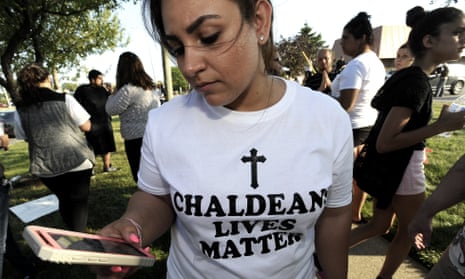Iraqis are being swept up in immigration raids across the US and targeted for deportation by the Trump administration, in a crackdown attorneys and advocates described as a “death sentence” for members of Iraq’s Christian minority.
US Immigration and Customs Enforcement (Ice) arrested more than 200 Iraqi nationals over the weekend who have been the subject of deportation orders following criminal convictions or pending criminal charges.
One hundred and fourteen people were detained in Detroit alone, most of whom are members of Iraq’s Chaldean minority – which, like other Christian groups, has been targeted for persecution by Islamic State and other jihadist groups.
Najah Konja, 55, who was arrested in Detroit on Sunday morning, immigrated to the US with his family in 1977. No other relatives remain in Iraq, according to his brother, Shoki “Steve” Konja.
“What is he going to do there?” Steve Konja, a US citizen, told the Guardian. “Basically, they are sentencing him to death.”
Konja said his brother does not speak Arabic, and that the last member of their family to leave Iraq was kidnapped twice and held for ransom because of his relatives in the US. “The government of Iraq cannot protect and defend its own citizens – let alone a bunch of Christians coming from the US,” Konja said.
These concerns were echoed by advocates including the Minority Humanitarian Foundation (MHF), which provides aid to Iraqi minorities. MHF planned to file a lawsuit with the American Civil Liberties Union to stop the deportation of Chaldeans to Iraq.
“Donald Trump has essentially given these Christians a death sentence,” said MHF founder and president, Mark Arabo.
Last year, then US secretary of state John Kerry said a genocide was occurring against Christians in Iraq, though international courts have not officially given the violence there that designation.
Ice spokeswoman Gillian Christensen said an “overwhelming majority” of those arrested were convicted for crimes including “homicide, rape, aggravated assault, kidnapping, burglary, drug trafficking, robbery, sex assault, weapons violations and other offenses”.
In Detroit, Christensen said the operation “was specifically conducted to address the very real public safety threat represented by the criminal aliens arrested”.
But community advocates scoffed at that claim, arguing many of the charges were handed down decades ago and those convicted had served their sentences for the crimes.
Konja served 23 years in prison for drug charges and was released in 2009. In prison, he pursued his GED and helped teach other inmates, his brother said.
For the past eight years, he has worked at a large chain store where he was a director of operations, overseeing 400 employees. “He completely turned his life around,” his brother said.
Steve Konaj said the arrest has left him disillusioned with the country he considers his home.
“This is not United States,” he said. “I’ve been here 40 years. I believe in the dream, I believe in the constitution. I love it to death. I’m willing to sacrifice myself if needed, but to tell these people: ‘You committed a crime 30 years ago, when you were 19, 20 – now you have to pay again for that mistake.’”
Iraq had previously not cooperated with US deportation efforts but the two countries negotiated a new policy in March after Trump issued a travel ban for citizens of seven Muslim-majority countries including Iraq.
The ban was revised after it was struck down in a federal court; the new ban – which is also the subject of a legal challenge – no longer includes Iraq and removes language that prioritized entry for religious minorities, including Christians, from these countries.
The executive order said the rules for Iraq had changed because “the Iraqi government has expressly undertaken steps to enhance travel documentation, information sharing, and the return of Iraqi nationals subject to final orders of removal”.
Another focus of the recent sweep was Nashville, Tennessee, where at least 30 Iraqis were arrested, said local immigration attorney Andrew Free.
Unlike Detroit, Ice raids there have hit Kurds, members of the largest ethnic minority in Iraq, who have been fighting Isis alongside US soldiers in Syria.
Nashville has the largest population of Kurds in the US. Attorneys and advocates there said the Ice raids began by targeting people with criminal histories early last week. Then Ice conducted sweeps of predominantly Kurdish neighborhoods, going door-to-door starting at 6am.
In response, Drost Kokoye, who is Kurdish and a founder of the American Muslim Advisory Council, helped set up a hotline for people to call when Ice knocks on their door. She said the hotline has been “buzzing” every day from 6-9am since last week.
The sweep has had a chilling effect on the community. Kokoye said that at Nashville’s Kurdish mosque the daily breaking of the fast, iftar, the crowd is about a quarter of what it was at the beginning of Ramadan, which started before the Ice raids. She said: “People are terrified, people are rattled, people don’t feel safe in their homes.”
